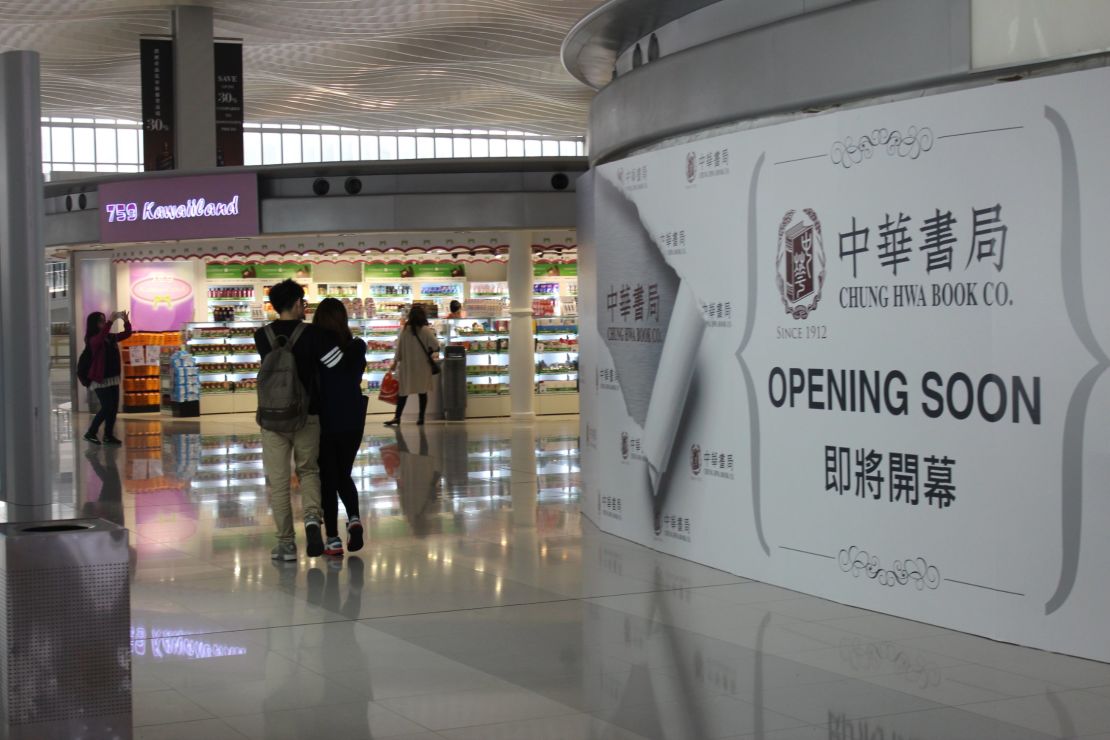Story highlights
Hong Kong's airport bookstores face huge cutbacks
Stores selling books banned in China replaced by state-owned chain
Cut triggers concerns as Hong Kong's missing bookseller cases continue to baffle
Authorities and bookstores cite commercial reasons for their closing
It used to be hard to miss the face of Xi Jinping at the Hong Kong International Airport.
Until recently, some 16 bookstores across two terminals carried books bearing the name and face of the Chinese president on their shelves.
They were popular buys for many Chinese travelers who passed through the transport hub each year, eager to steal a glimpse of the back-room politics and private lives of China’s ruling elites through books banned in the mainland.
With titles like “Rumor and Truth About Chinese Authorities” and “The Secret Trade Between Rich People and Top Officials,” these stores peddled often poorly sourced and gossipy looks at the leadership as well as more serious publications.?
But it’s getting harder for travelers to pick up these titles – 11 of the bookstores have closed this year.
“Serious historical studies, memoirs and gossipy trash alike sold well to mainland visitors looking to buy books to bring home,” independent publisher Renee Chiang told CNN.
Some shops have been replaced by other businesses – one is now a Calvin Klein store – while a state-owned Chinese book chain has replaced others.
The businesses say they’re closing for commercial reasons, in part due to the popularity of smartphones and e-books, but critics say it’s another sign of Hong Kong’s eroding freedoms.
“Nail in the coffin”

Chiang, who runs the New Century Press in Hong Kong with founder and husband Bao Pu, said sales have also gone down for them, especially for “books on sensitive topics.”
“I have no proof of anything, but these changes at the airport seem to be a part of the ongoing campaign to stop the flow of Hong Kong books into the mainland, and another nail in the coffin of independent publishing in Hong Kong,” said Chiang.
New Century Press is best known for publishing critically acclaimed but controversial titles such as “Prisoner of the State: The Secret Journal of Premier Zhao Ziyang.”
Zhao is a former Chinese Communist Party chief who was purged after sympathizing with student protesters in Tiananmen Square in 1989.
“The airport was an important part of the independent publishing industry of Hong Kong, as the vast majority of the readers of books on sensitive political topics are actually mainlanders, not local Hong Kong people,” Chiang said.
“It’s all business”
Airport management and several bookstores have denied that political motivations were behind their closing.
“Based on our regular customer survey and assessment on passenger needs due to change in reading habit and advancement in technology, (the Airport Authority) has consolidated the number of bookstores from 16 to 10,” a spokesperson from the Hong Kong Airport Authority told CNN.
“As for the types of books sold at the bookstores, please note that selection of books to be offered in the shops are decided by bookstore operators.”

The Singapore-owned Page One has closed all six of its stores, while French-owned Relay has shuttered its stores by half, leaving five, which are accessible only after check-in.
Chung Hwa Book Co. has moved in to take over, obtaining five locations in the airport through the bidding process – two outside the restricted area.
Established in Shanghai in 1912, Chung Hwa opened its first Hong Kong branch in 1927. The company is owned by the mainland-backed conglomerate Sino United Publishing, the dominant and biggest commercial publisher in Hong Kong.
“Sino United Publishing is a Chinese state-owned company but we run independently according to Hong Kong’s laws and market needs,” a representative at Sino United Publishing’s Hong Kong office told CNN.
Political shake-up?
The bookstore shakeup has triggered concerns that political pressure may be at play.
Earlier this year, local newspaper Apple Daily reported that the airport’s Page One stores had pulled books critical of China off the shelves in response to a company memo.
News of the memo followed the disappearance of five booksellers associated with publisher Mighty Current and its shop Causeway Bay Books.
Protests erupted in the city over fears that they had been abducted by Chinese security forces for selling banned materials critical of China’s elites.
Three of the five have since returned to Hong Kong. Chinese authorities are still holding the other two.
Page One has since stated that the “(Apple Daily) article and the alleged Internal Memorandum are untrue and misleading” and that the memo was a “forgery.”
Representatives of the Singapore-owned chain, whose branches have made forays into the mainland market in recent years, also denied speculation that its withdrawal from the airport had anything to do with the politically sensitive titles it had carried.
The group told CNN it did not put in a bid for retail space after their lease expired because of the “weak retail situation in Hong Kong” and that suspicions over political pressures are “totally untrue.”
A local visit
It’s not just tourists killing time before a flight who buy the books.?
Earlier this month CNN caught up with Mr. Cheng, who only offered his last name, while he was browsing through books at the remaining Relay in the check-in area at Hong Kong International Airport.
He said he?often came?to this store to check out the politics and biography sections.
The religion instructor expressed surprise when he learned the store was set to close after April 7.
“For these kinds of books, there’s a more complete stock here than in other places,” Cheng said,?with a grin, as he gestured towards the titles, some salacious and otherwise politically charged.
